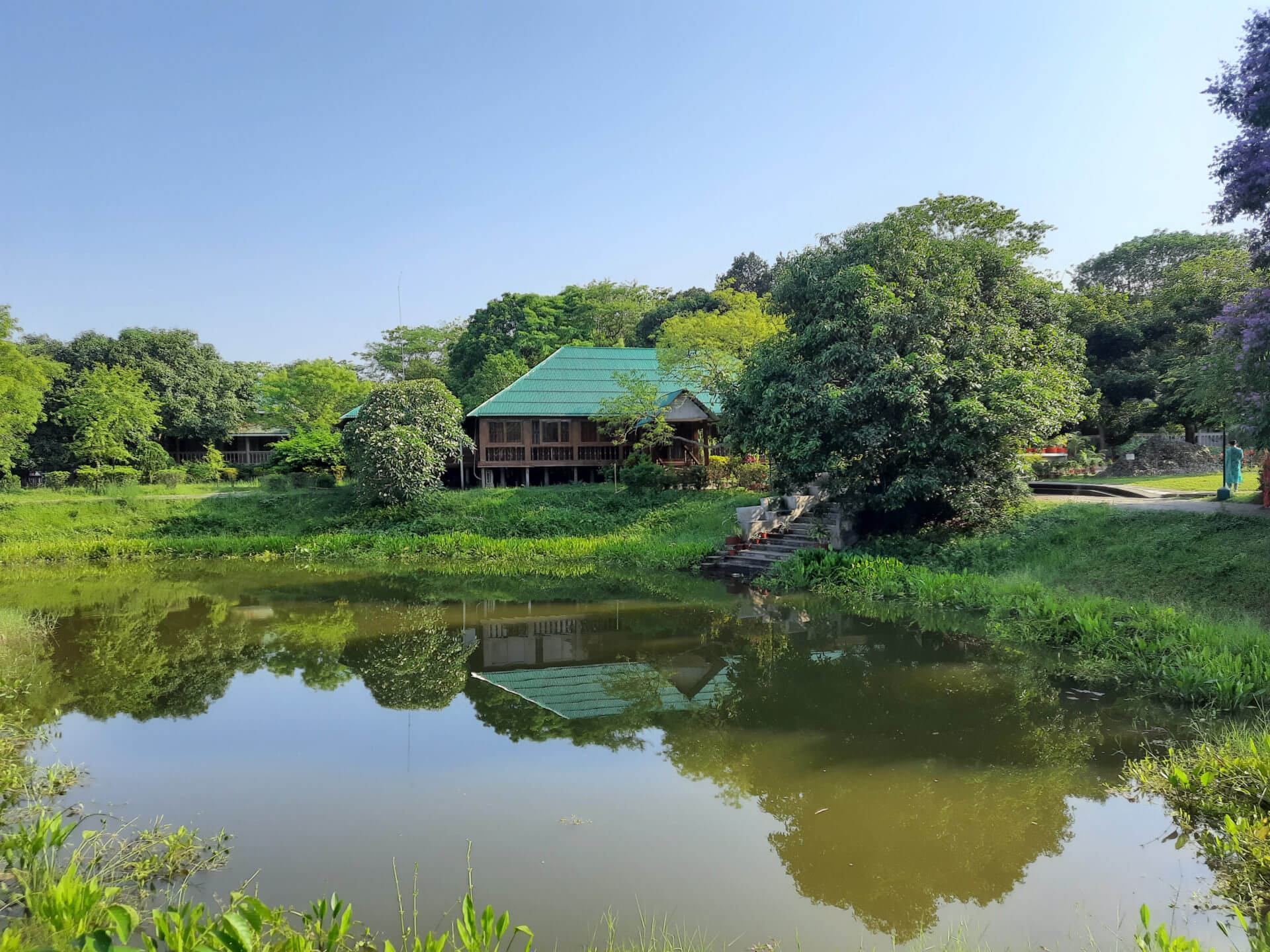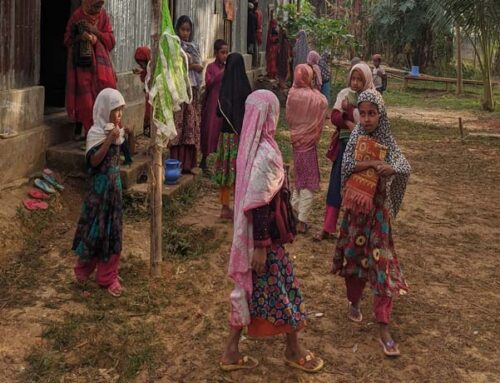Photo: Cottage in an Organic Tea Estate Courtesy: Sharif Abu Hayat
Green entrepreneurship refers to a special subset of entrepreneurship that focuses on creating and implementing solutions to environmental problems. It also promotes social changes to not harm the environment.[1] Entrepreneurs working in this space are different from the conventional ones; because their ideas and business practices positively impact the environment; and personal intrinsic values and motivation drive them. In this new business paradigm; entrepreneurs have wider motivations than just selling eco-friendly products or services for a niche market.[2]
One example of green entrepreneurship in India is Green India Building Systems and Services; a business founded by two green entrepreneurs, Arun Shenoy and Mandar Kaprekar. They developed an air-conditioning system based on geothermal heat exchange; which saves up to 60% energy compared to traditional air conditioning systems. Green India Building Systems and Services has grown over time and now has approximately 85 corporate clients across India; demonstrating that they, too, have profit objectives and the desire to create sustainable business models.
However, the role of green entrepreneurs is not restricted to making green products that save natural resources and eliminate the usage of toxic chemicals. It also extends to incorporating green business practices and challenging the traditional systems and scenarios to adopt a greener perspective.
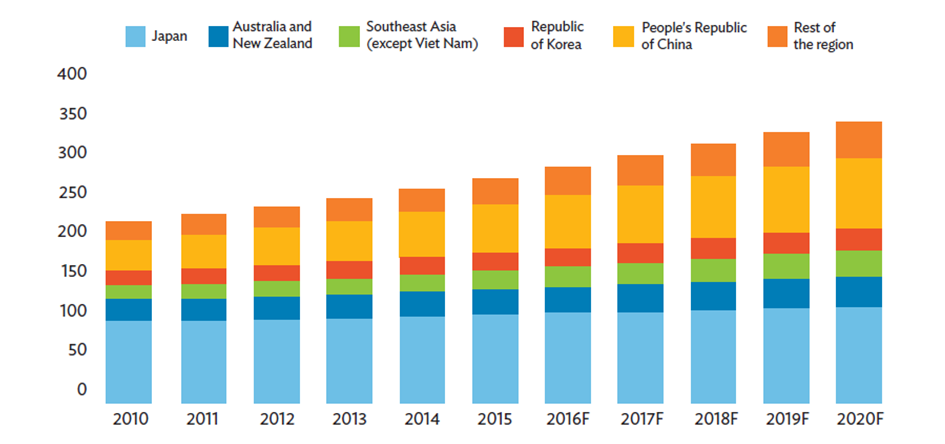
Source: Environmental Business International Inc. 2015.
The figure above represents the leaders of the environmental market within Asia and the Pacific regions. Japan and China are the largest contributors to the market for environmental goods and services.
Why should Bangladesh focus on Green Entrepreneurship?
According to the Global Climate Risk Index 2021, Bangladesh is the seventh most climate change vulnerable country in terms of long-term vulnerability. The country experiences frequent natural calamities throughout the year. Bangladesh incurred an estimated loss of USD 3.72 bn between 2000 and 2019 due to climate change.
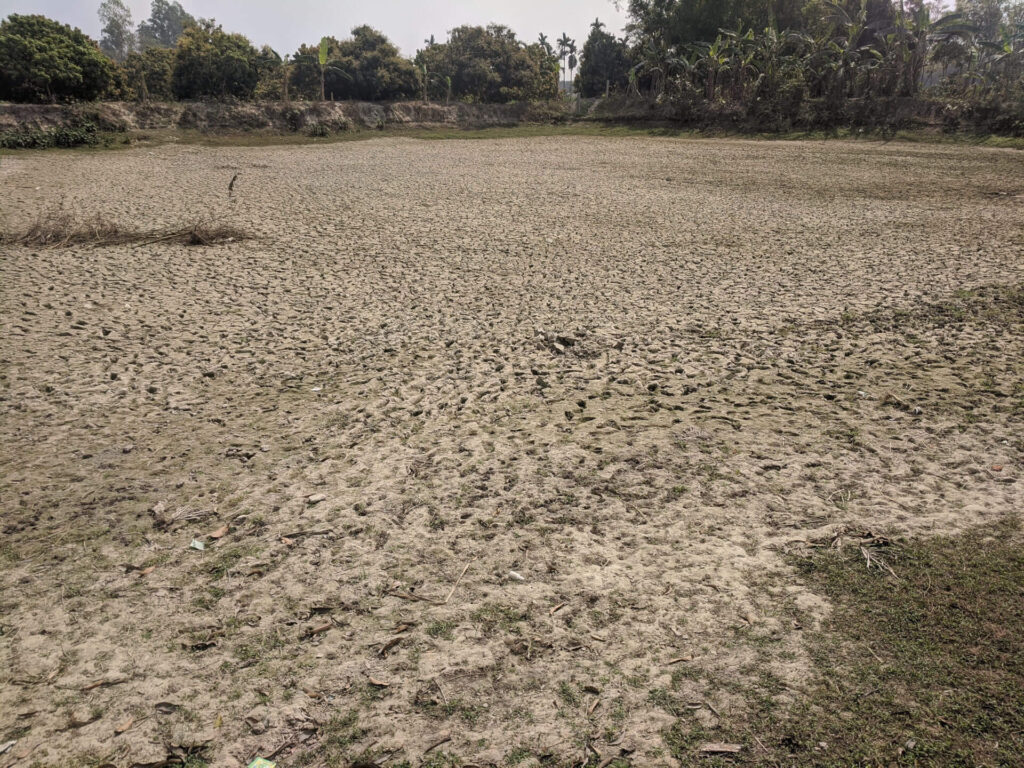
A recent study was conducted by researchers at Duke University in the US. It revealed that Bangladesh is losing 7 billion working hours annually due to extreme heat exposure caused by global warming.
The Bureau of Manpower, Employment, and Training (BMET) projected that 40% of the productive land in the southern region of Bangladesh will be lost by 2080. Bangladesh could lose up to 17% of its land due to rising sea level by 2050, which will make around 20 million people homeless.
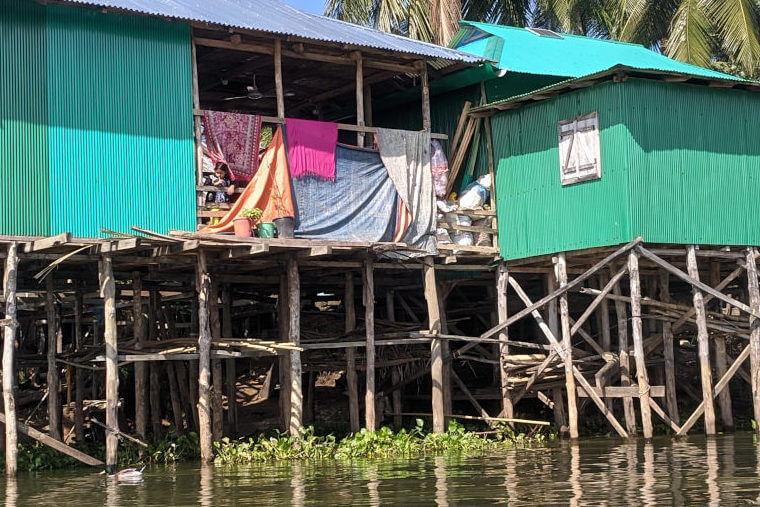
Therefore, it is crucial now for both the public and private sector organizations to make climate change prevention a priority in their long-term plans. Besides the need to overcome the challenges posed by climate change; an ongoing project was funded by Climate and Development Knowledge Network (CDKN). It identified the following incentives to focus on climate investment for small and medium-sized enterprises (SMEs) in Bangladesh:
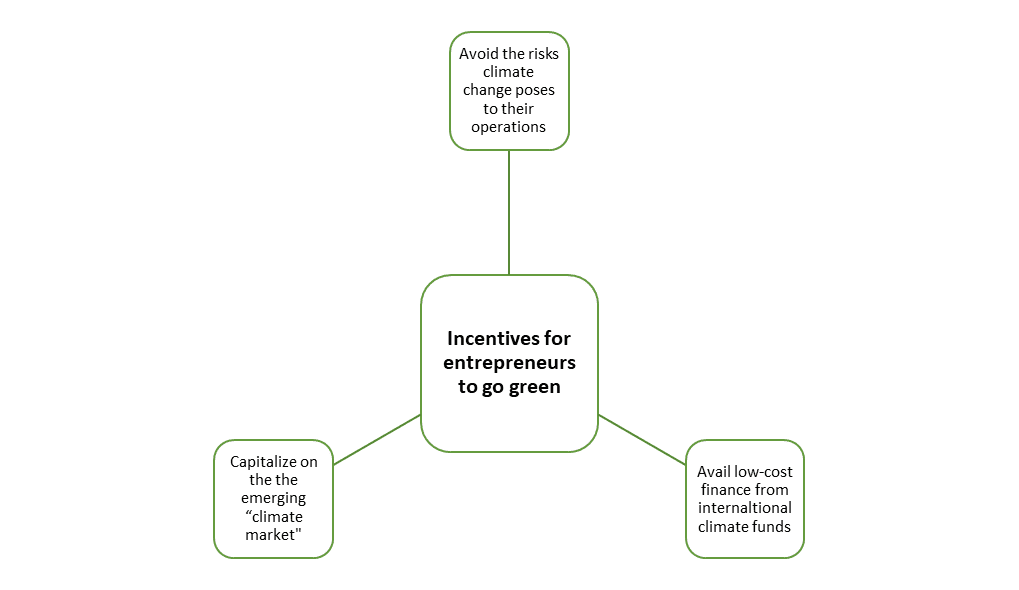
There is a great opportunity for innovation for the entrepreneurs that will make the country more resilient to climate change. One such lucrative area for innovation in Bangladesh is agriculture. Due to the impending threat of land loss as a result of climate change; there needs to be adequate innovation in climate-resilient seed varieties and other agricultural practices; so that farmers can maintain the size and quality of their harvests over time. Companies such as Lal Teer Seed Limited and Advanced Chemical Industries (ACI) have already started investing in this sector.
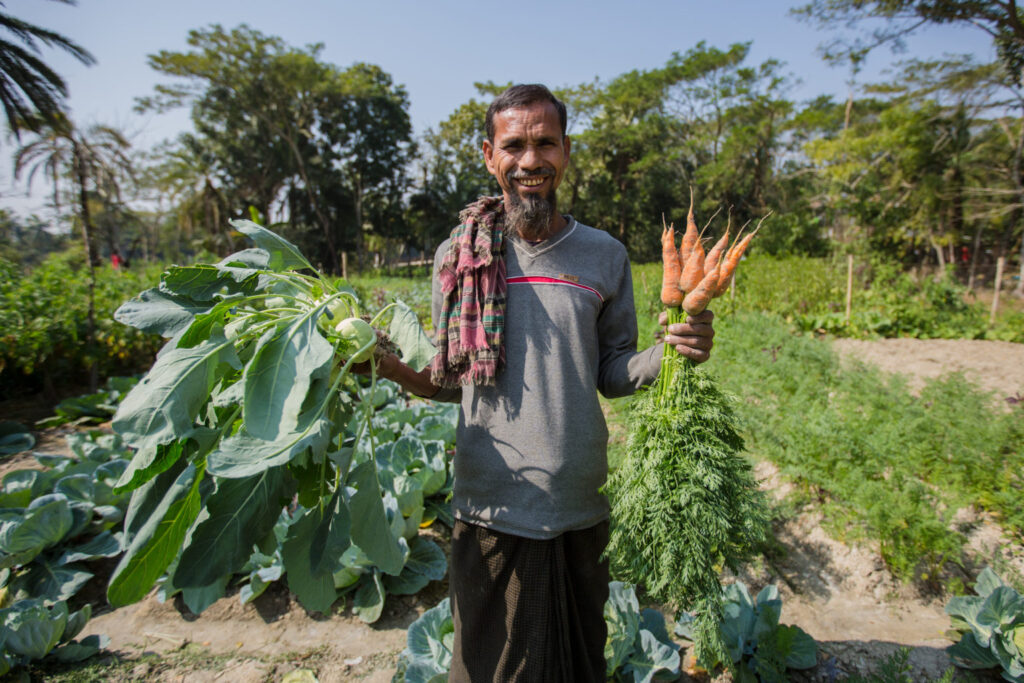
Lal Teer Seed Limited has invested in saline-resistant seed varieties for coastal areas and drought-resistant crops for northern areas of Bangladesh. ACI has invested in a variety of disaster-resistant products and fertilizers in order to mitigate the effects of climate change on agriculture.
These examples illustrate the scope of green entrepreneurship in Bangladesh. Although the concept is in its early stages, with proper government and private sector intervention; entrepreneurs can profit from green opportunities and help Bangladesh mitigate its climate change challenges.
Role of SMEs in Green Entrepreneurship
SMEs play an integral part in the economy and account for an average of 97% of all enterprises; 69% of employment, and 41% of GDP in the ASEAN region (Asian Development Bank, 2020). Yet they are often overlooked in the plan to combat climate change. These SMEs are the ones that make the most impact in communities and local economies. But more often than not, all the attention goes to investing in renewable energy and expensive infrastructures by large, established corporations. In reality, it is the small and medium-sized enterprises in particular who should be encouraged to take initiatives in green entrepreneurship.
SMEs in Bangladesh can develop solutions that solve the local problems resulting from climate change if they get access to the right tools and investment opportunities.
For example, green entrepreneurs like Sabiha Islam Bithi is getting support from Bangladesh Youth Enterprise Advice and Helpcentre (B’YEAH). The support is given in the regional program named “Accelerating Youth-led Businesses in the Digital Era”. It was implemented with support and funding from Youth Business International (YBI) and the IKEA Foundation. The objective is to equip young people in India and Bangladesh with entrepreneurship skills to build and sustain thriving businesses; create jobs and boost local economies.
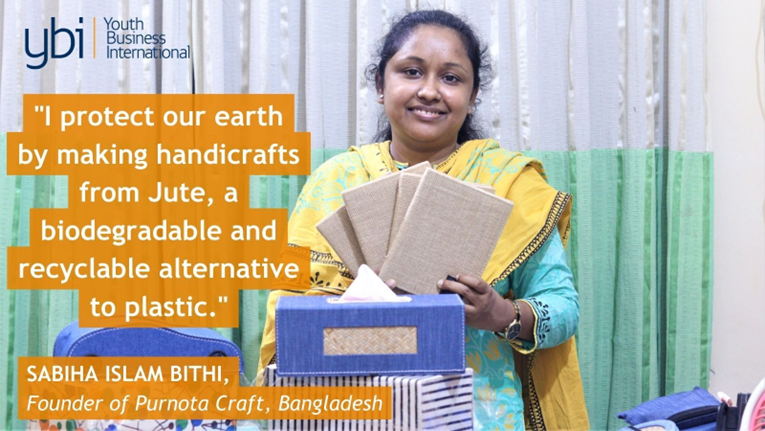
With the support from B’YEAH; Sabiha has been able to bring sustainable economic growth to the rural Bangladesh while also protecting our earth. All her items are made from Jute which is biodegradable; and its cultivation enriches the soil and cleanses the air.[WB1]
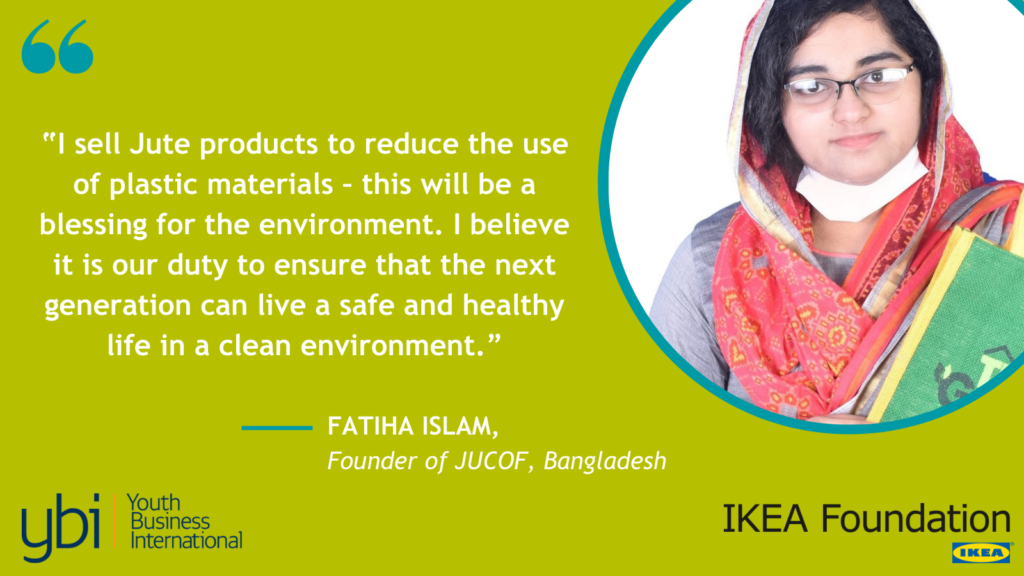
In addition, like Sabiha, B’YEAH also supported Fatiha of JUCOF, founded in 2017, manufacturing Jute bags, gift items and clothing such as blazers. Initially, she received no support from her family who didn’t want her to get involved in business. Furthermore, due to COVID she had to shut down her business for two months and all of her orders were cancelled. However, things started looking up again when she was introduced to YBI member B’YEAH and attended capacity building programs and advisory sessions of YBI’s programme funded by IKEA Foundation.
Thus, the involvement of the small businesses in green entrepreneurship should be one of the key priorities of the government in its plan to combat climate change.
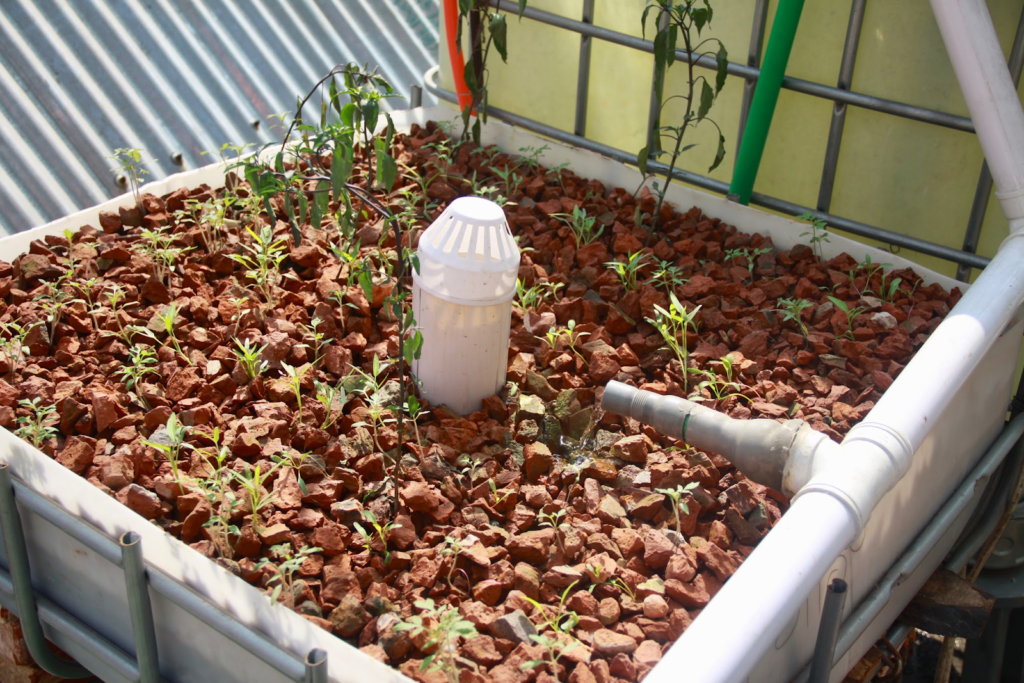
Initiatives are taken by the government and the private sector so far
Bangladesh submitted an Intended Nationally Determined Contribution (INDC) to United National Framework Convention on Climate Change (UNFCCC); with the target of reducing greenhouse gasses by 15% from a Business as Usual (BAU) level by 2030; during the Paris Agreement. Moreover, during the COP-15 in Copenhagen; the Development Assistance Committee (DAC) members pledged to distribute USD 9.4 bn per annum among developing countries. The goal is to reduce carbon and greenhouse gas emissions from developing countries (Amin et al., n.d.). During COP26, there has been a call for doubling the fund for adaptation and compensation for loss and damage control. Bangladesh is one of the top 20 recipients of this foreign aid. It has received over USD 1 Bn fund till 2018.
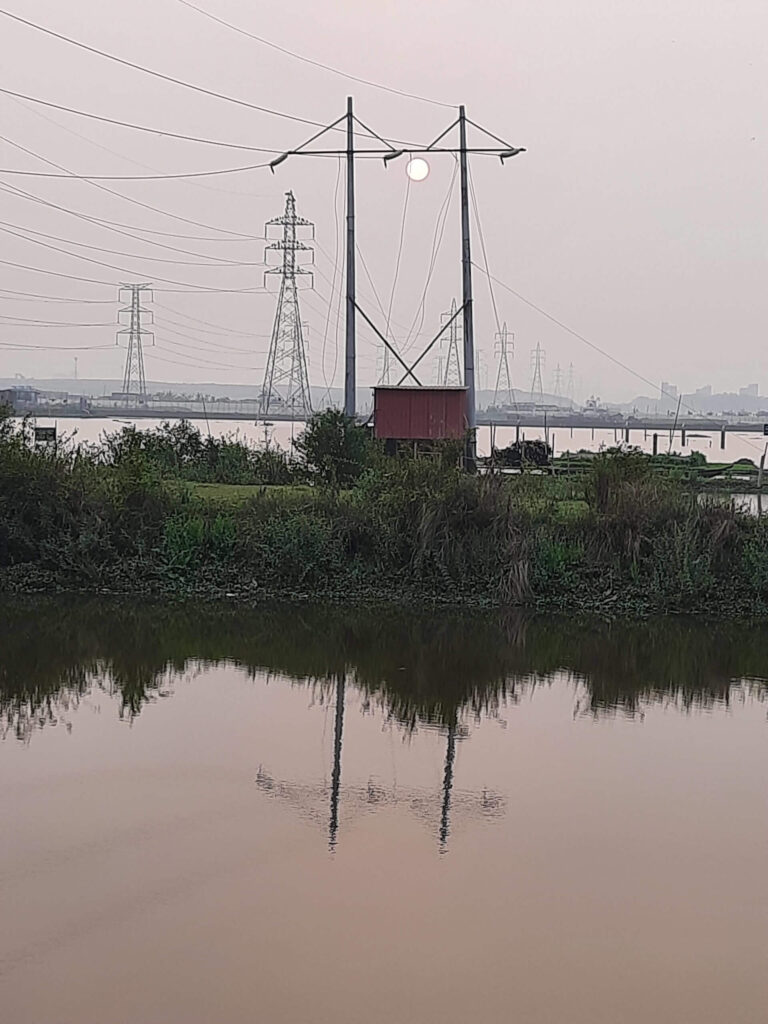
One adaptation plan designed by the government to accomplish its climate goals is the Bangladesh Delta Plan (BDP) 2100. It aims to ensure sustainability and preservation of water resources in Bangladesh.
Another green initiative taken by the government is Local Government Initiative on Climate Change (LoGIC). This aims to benefit 200,000 climate-vulnerable households by providing capacity-building support; assistance in policy advocacy; and access to climate funds.
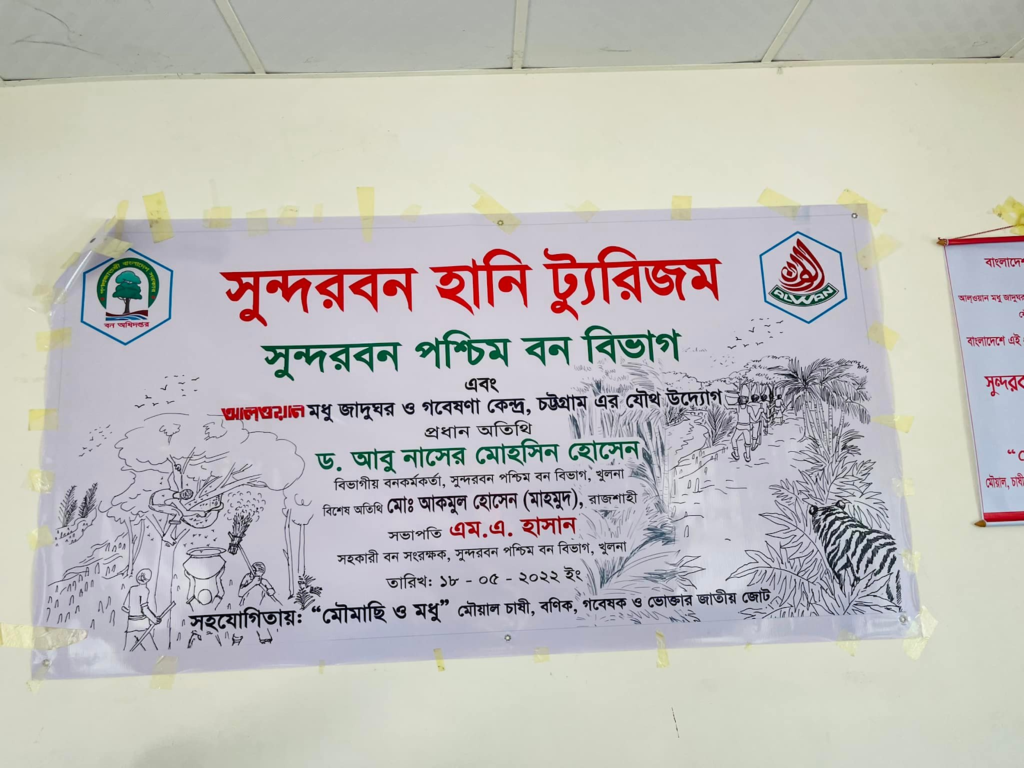
Furthermore, the International Labour Organization (ILO) is promoting green entrepreneurship in Bangladesh’s tourism and agricultural food sectors. Their initiatives include green financing schemes, national waste management, and recycling programmes, promotion of green skills and green energy.
There have been initiatives from the private sector as well. BetterStories, a business incubator established in 2009; has partnered with the World Bank Group and government of UK to launch Bangladeshi Climate Innovation Center in 2018. This initiative will help local startups develop and scale innovative green technologies that help mitigate the climate change challenges. The center supports 20 companies a year by providing coaching, training, market linkages and investment facilitation.
One of the largest local NGOs in Bangladesh, BRAC, is contributing significantly in the combat against climate change. In 2018 they reached 1.7 million people in 336,000 households through their climate resilient solutions. A few of their interventions include climate resilient water, sanitation and hygiene (WASH) services; low-cost resilient housing in urban and rural contexts; adaptive agricultural technologies and livelihood options; access to finance for the people, building capacity of its staff and creating awareness. Their main focus lies on working with youth and empowering them.
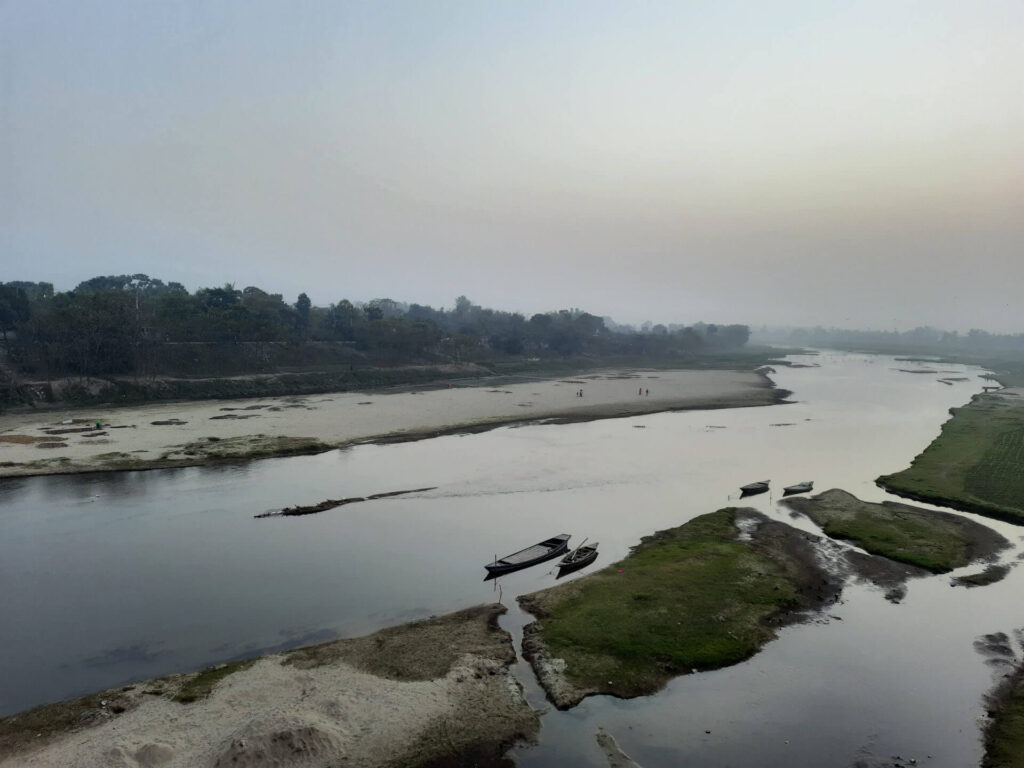
However, two of their core challenges are finding the appropriate technology for climate change prevention in every context; and finding the funds for climate resilient projects. This is where green entrepreneurs intervene.
Collaboration of NGOs and the government
Both local and international NGOs and the government are already working to overcome the challenges of climate change. NGOs work at the grassroots level. They have an in-depth understanding of what the local community needs to overcome the climate challenges; while the government holds the funds required to implement the climate-resilient projects. The NGOs can be the intermediary between the green entrepreneurs and the government. Green entrepreneurs can bring innovative ideas that will effectively solve climate challenges; but they lack the funding and mentorship needed to advance their ideas and establish a sustainable business model.
NGOs can play a vital role here. By collaborating with the government and other international bodies, they can channel the climate change funds into green entrepreneurship. NGOs will need to ensure that climate funds are properly utilized by green entrepreneurs through constant monitoring, mentorship, and teaching. All these can be done by the local and international NGOs in Bangladesh. They have the capacity to teach and raise awareness among people from rural and urban areas on different social issues.
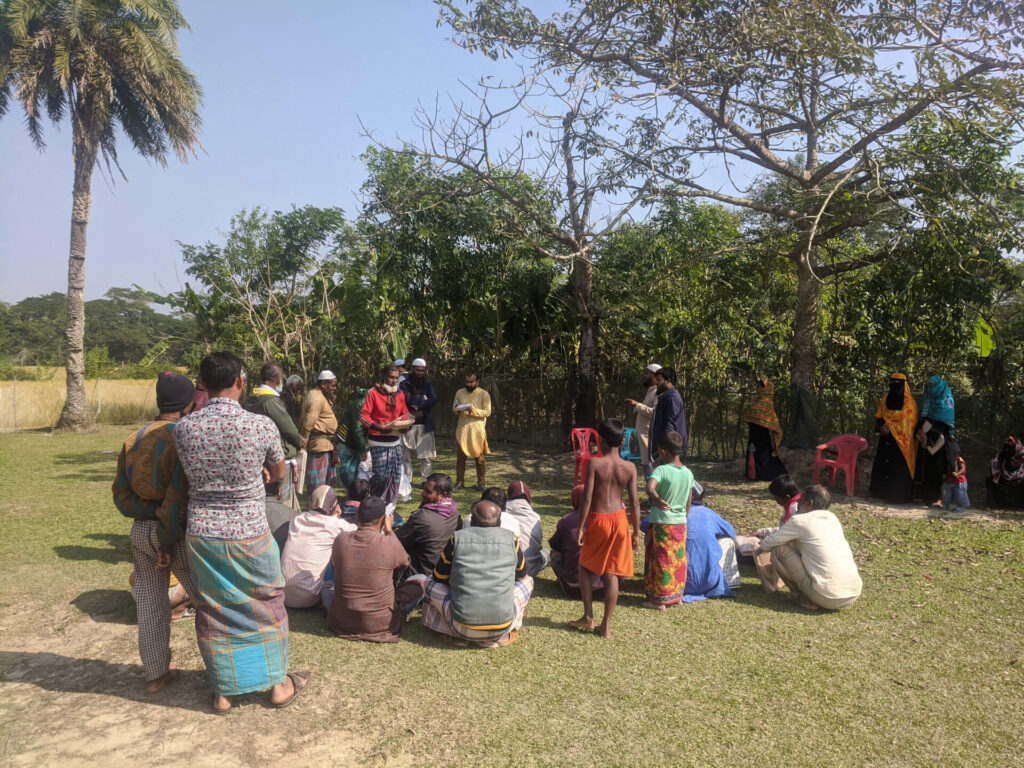
Overall, the partnership between NGOs and the government is a long-term plan. Green entrepreneurship is still in its early stages in Bangladesh; and the first step toward promoting green entrepreneurship should be raising awareness about its need and opportunities among Bangladeshi youth. However, there is an urgent need for more active participation of private sector SMEs; as their contribution can assist Bangladesh in taking a more holistic approach to combating climate change. NGOs must raise awareness of how SMEs can mitigate climate change problems; and also highlight suitable investment opportunities that can deliver highest returns while also building sustainable business models for green entrepreneurs.
References
1. Ulla Anneli Saari and Sanna Joensuu-Salo, ‘Green Entrepreneurship’ (2020) <www.researchgate.net/publication/340274392_Green_Entrepreneurship> accessed 17 May 2022
2. ‘How the climate crisis is impacting Bangladesh’ (The climate reality project, 9 December 2021) <www.climaterealityproject.org/blog/how-climate-crisis-impacting-bangladesh> accessed 17 May 2022
3. Md Shahnawaz Khan Chandan, ‘Global warming: Bangladesh loses 7b working hours a year’ The Daily Star (26 February 2022) <www.thedailystar.net/news/bangladesh/news/global-warming-bangladesh-loses-7b-working-hours-year-2970601> accessed 17 May 2022
4. UNB, Dhaka, ‘Rising sea levels can render 20m Bangladeshis homeless by 2050’ The Daily Star (14 September 2021) <www.thedailystar.net/environment/climate-crisis/climate-loss/news/rising-sea-levels-can-render-20-million-bangladeshis-homeless-2050-2175646> accessed 17 May 2022
5. Asian Development Bank, ‘Asia Small and Medium-sized enterprise monitor 2020’ (Asian Development Bank, 2020) <www.adb.org/sites/default/files/publication/646146/asia-sme-monitor-2020-volume-1.pdf> accessed 17 May 2022
6. LightCastle Analytics Wing, ‘COP26: Consequences on Bangladesh’s Economy’ (LightCastle Partners, 15 February 2022) <www.lightcastlebd.com/insights/2022/02/cop26-consequences-on-bangladeshs-economy/> accessed 17 May 2022
7. The Third Pole, ‘Bangladeshi NGO factors climate into all projects’ (The Third Pole, 12 December 2019) <www.thethirdpole.net/en/climate/bangladeshi-ngo-factors-climate-into-all-projects/> acessed 17 May 2022
8. Jodyanne Kirkwood and Sara Walton, ‘What motivates ecopreneurs to start businesses?’ (2010) International Journal of Entrepreneurial Behavior & Research 16(3)
9. Amin, Z., Khan, F. H., Rafi, K. M., Morshed, M. T., & Anwar, S. (2021, November 19). Bangladesh Donor Funding Landscape. LightCastle Partners. https://www.lightcastlebd.com/insights/2021/11/bangladesh-donor-funding-landscape/
About Bangladesh Youth Enterprise Advice and Help Centre (B’YEAH)
Founded in 2007, Bangladesh Youth Enterprise Advice and Help Centre (B’YEAH), a not-for-profit and non-political organization, has been a pioneer in promoting youth entrepreneurship in Bangladesh. Our mission is to economically empower the Bangladeshi youth supporting them to start and sustain their businesses, create jobs, and strengthen communities. We equip disadvantaged youth by building the necessary skills, confidence, and connections through capacity building, mentoring, market linkage, and advisory services.
We are also part of the Youth Business International based in London. It is a network of more than 50 countries worldwide. Members are connected and supported by a dedicated network team based in London, UK and Bogota, Colombia. Due to the vast YBI network, we are uniquely positioned to bring in tried and tested solutions for youth entrepreneurs from around the globe and localize them as per community needs.
Author

Sadia Tabassum Addrita
Social and Green Entrepreneurship Lead
Bangladesh Youth Enterprise Advice and Help Centre (B’YEAH)
Editor

Md. Rashed Mamun
Executive Director
Bangladesh Youth Enterprise Advice and Help Centre (B’YEAH)

